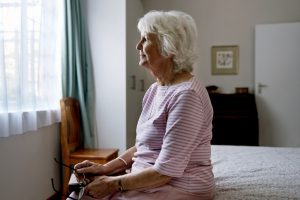 If you’ve ever experienced anxiety you know it can be unsettling. Your heart races, you develop a headache and your palms become clammy. You try to take deep breaths to calm down, but it doesn’t seem to work.
If you’ve ever experienced anxiety you know it can be unsettling. Your heart races, you develop a headache and your palms become clammy. You try to take deep breaths to calm down, but it doesn’t seem to work.
We all experience anxiety at some point in our lives. Whether we have an important deadline to meet or the anxiety is a side effect of medications you take, there are many ways one might become anxious.
Advertisement
For some, anxiety comes and goes with life’s stressors. For others, anxiety is an ongoing battle they face daily. But new research suggests your anxiety may be linked to this common habit.
Sitting: A possible cause of anxiety
 A recent review of previous studies is linking too much sitting time with an increase in anxiety. But the results may not be as clear cut as we’d like them to be.
A recent review of previous studies is linking too much sitting time with an increase in anxiety. But the results may not be as clear cut as we’d like them to be.
Researchers from Deakin University’s Center for Physical Activity and Nutrition Research in Australia revealed anxiety doesn’t necessarily follow a linear path. On one hand, a person may sit in front of a TV for hours and not get enough sleep. Lack of sleep may contribute to anxiety. On the other hand, individuals with anxiety may be less prone to being social and isolate themselves, so they sit all day.
For the review, nine previous international studies were examined to determine sitting’s role in anxiety. The general outcome from the review is that there is a definite link between anxiety and sitting.
Earlier this year, it was reported that long hours sitting were linked to higher rates of heart disease. Researchers said sitting was actually worse than smoking. So the real take-away is that we need to get moving.
Treating anxiety and combating sitting hours naturally
 Seniors, in particular, live very sedentary lives. Mobility may be limited since they are no longer in the workforce. As research suggests, this is harmful to their health, so seniors should take note of these findings and become more active.
Seniors, in particular, live very sedentary lives. Mobility may be limited since they are no longer in the workforce. As research suggests, this is harmful to their health, so seniors should take note of these findings and become more active.
Exercise, for one, is not only effective in reducing the hours of sitting, but it can also help improve symptoms of anxiety.
The Anxiety and Depression Association of America (ADAA) suggests that physical activity is an effective means to treat symptoms of anxiety. In fact, in as little as 10 minutes one can start to reap the mood-boosting benefits of exercise. And we’re not necessarily suggesting a high-intensity workout either. A brisk walk, completing some chores or even partaking in a favorite hobby is enough to offer benefits.
The ADAA noted that people who became more active after leading sedentary lives had lower rates of anxiety and depression.
If you want to improve your overall health while reducing your anxiety, create an exercise plan. It’s important to pick something you enjoy and can stick with it. Even 10 minutes a day can offer benefits. To work your way up to at least 30 minutes, break up your physical activity time in three, 10-minute segments throughout the day. You may find this easier and can work your way up from there.
Sitting continues to be linked to health problems and avoiding it is truly the easiest way to improve overall health. So instead of sinking into the couch to watch TV, get moving and watch your health improve.
Related Readings:
How regular exercise affects mood
At some point in our lives, we’ve felt sad, stress, angry and simply down in the dumps. Usually these emotions have been tied to an event and so they tend to pass as time heals. But if you’re feeling low over a longer period, you may need to take action to boost your mood. Continue reading…
Advertisement
During the day, you’re planted in front of a computer screen and when you finally get home you melt into your couch. Not much room for moving around is there? Sitting has become an epidemic – and sitting is killing you. Continue reading…
Sources:
http://news.health.com/2015/06/19/can-too-much-sitting-make-you-anxious/
http://www.adaa.org/living-with-anxiety/managing-anxiety/exercise-stress-and-anxiety
